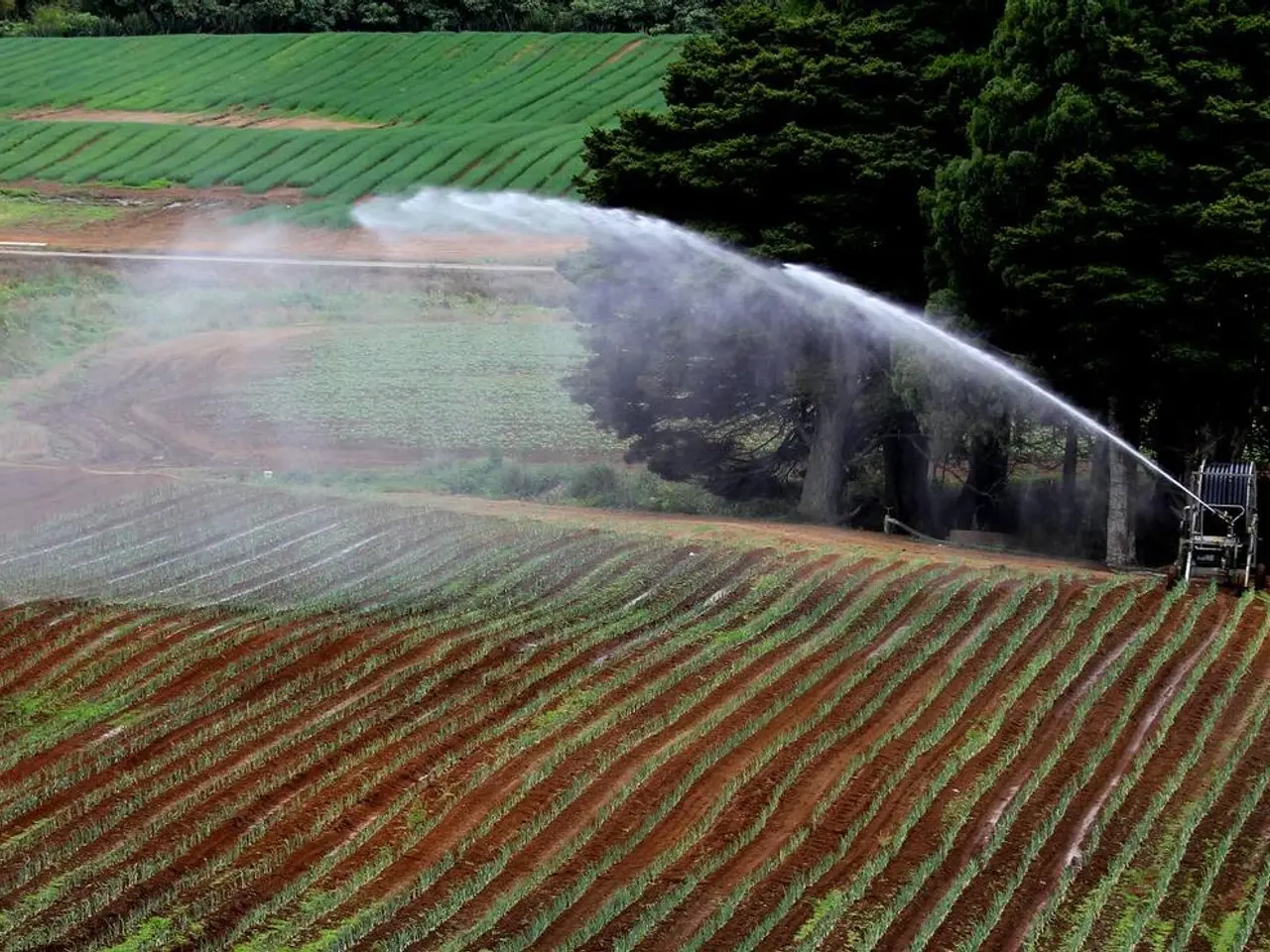Salt-resistant wheat moves one step closer to commercial availability as trials proceed across various markets, spearheaded by OlsAro.
In the face of increasing soil salinity, a pressing concern in India where it's estimated that half of the arable land could become salt-affected by 2050, innovative solutions are being sought. One such solution comes from OlsAro, a Swedish startup focused on developing salt-tolerant wheat and other crops resilient to environmental stressors.
OlsAro, in partnership with DCM Shriram, a leading Indian agricultural, chemicals, and building materials group, is conducting field trials in multiple geographies, including Bangladesh, Argentina, Pakistan, Kenya, and Turkey. In India, DCM Shriram received three OlsAro salt-tolerant wheat lines in November 2024 and conducted trials in the Rabi season 2024-25 in three locations in Uttar Pradesh and Bihar.
The results of these trials have been encouraging, with early indications showing OlsAro's lines performing well compared to local elites. DCM Shriram is keen to conduct more trials and test for another season. OlsAro's CEO, Elén Faxö, claims the company can help partners deliver meaningful increases in yield vs elite local varieties in saline soil.
OlsAro employs a "population-based approach" with EMS mutagenesis for variety development, which is non-GM and can be marketed globally without being considered GM. This approach allows OlsAro to screen down on SNPs of interest for target traits and then integrate the trait via gene editing or the population-based approach in local elite varieties.
While OlsAro is targeting large seed company partners for commercial agreements, it is not building huge operations capacities but will be a deep tech R&D resource. The company aims to reach the market in Bangladesh by 2027, having entered the second year of DUS testing.
In addition to salt-tolerant wheat, OlsAro is also working on crops that are more heat-tolerant and have improved nitrogen efficiency. The company's ultimate goal is to contribute to sustainable agriculture by developing crops that can withstand the challenges of climate change and ensure food security.
The advancements in OlsAro's salt-tolerant wheat development are significant, particularly in India where the need for such crops is urgent. The use of these crops can increase productivity by up to 2 tons per hectare compared to traditional varieties, while integrated soil and crop management enhance productivity further and promote sustainable land use. Improved wheat cultivation on saline soils raises land value and provides better income opportunities for farmers, especially when combined with innovative practices like relay cropping to diversify income sources.
As OlsAro continues to make strides in its research, it is poised to play a crucial role in addressing the global challenge of soil salinity and ensuring food security for future generations.
- In the realms of science and environmental science, OlsAro's innovative approach to developing salt-tolerant crops is sparking interest, particularly in the medical-conditions and chronic-diseases sector due to its potential impact on food-and-drink security.
- This solution to fighting soil salinity, a pressing issue in India, could help mitigate the economic impact of environmental-science-related issues on the agriculture industry.
- As part of the health-and-wellness and lifestyle industry, OlsAro's work could significantly influence food-and-drink production and distribution.
- In the field of finance, investors are keeping a close eye on the progress of OlsAro and its partners, with hopes of reaping the benefits of its success in business and real-estate markets.
- The energy industry may also benefit from OlsAro's advancements, as increased agricultural productivity can lead to increased resources for manufacturing.
- Data-and-cloud-computing could play a key role in tracking and analyzing the growth and performance of OlsAro's salt-tolerant wheat, offering valuable insights for the technology industry.
- Relationships between countries like India, Sweden, Bangladesh, Argentina, Pakistan, Kenya, and Turkey could strengthen due to collaborative efforts in research and development.
- In the arena of career-development, opportunities in sciences like environmental-science, agricultural-science, and biotechnology may see a surge as a result of companies like OlsAro.
- The education-and-self-development sector could see a shift towards focusing more on personal-growth and lifestyle-oriented topics related to health, wellness, and sustainable living.
- Shopping habits may evolve as consumers demand more eco-friendly and sustainable products, such as those derived from OlsAro's salt-tolerant crops.
- The sports industry, including football, baseball, hockey, golf, racing, American-football, tennis, and mixed-martial-arts, could indirectly benefit from OlsAro's advancements as athletes often require proper nutrition to maintain peak performance.
- Sports-analysis outlets might take note of OlsAro's breakthroughs and consider the impact of climate-change and environmental-science on athlete performance.
- Weather forecasting could gain additional importance as the predictability of crop yields and food-and-drink availability becomes more dependent on adapting to climate-change conditions.
- International travel could see shifts in destination preferences as the impact of climate-change and environmental-science on various regions becomes more pronounced.
- As OlsAro's salt-tolerant crops prove successful in managing soil salinity, they could potentially be applied to other regions around the globe facing similar challenges.
- The integration of OlsAro's variety development techniques into various industries, including nutrition, fitness-and-exercise, and home-and-garden, could lead to groundbreaking advancements in those fields.
- OlsAro's approach to variety development through a "population-based approach" and EMS mutagenesis could pave the way for new methods in various research areas, widening the possibilities for innovation.
- The availability and affordability of OlsAro's salt-tolerant crops may affect finance and investment strategies in the food-and-drink industry, depending on market demand.
- The long-term economic impact of OlsAro's solutions could resonate far beyond the agriculture industry, touching various aspects of society, including lifestyle, technology, relationships, travel, education, learning, personal-growth, career-development, shopping, and, perhaps, even sports.




